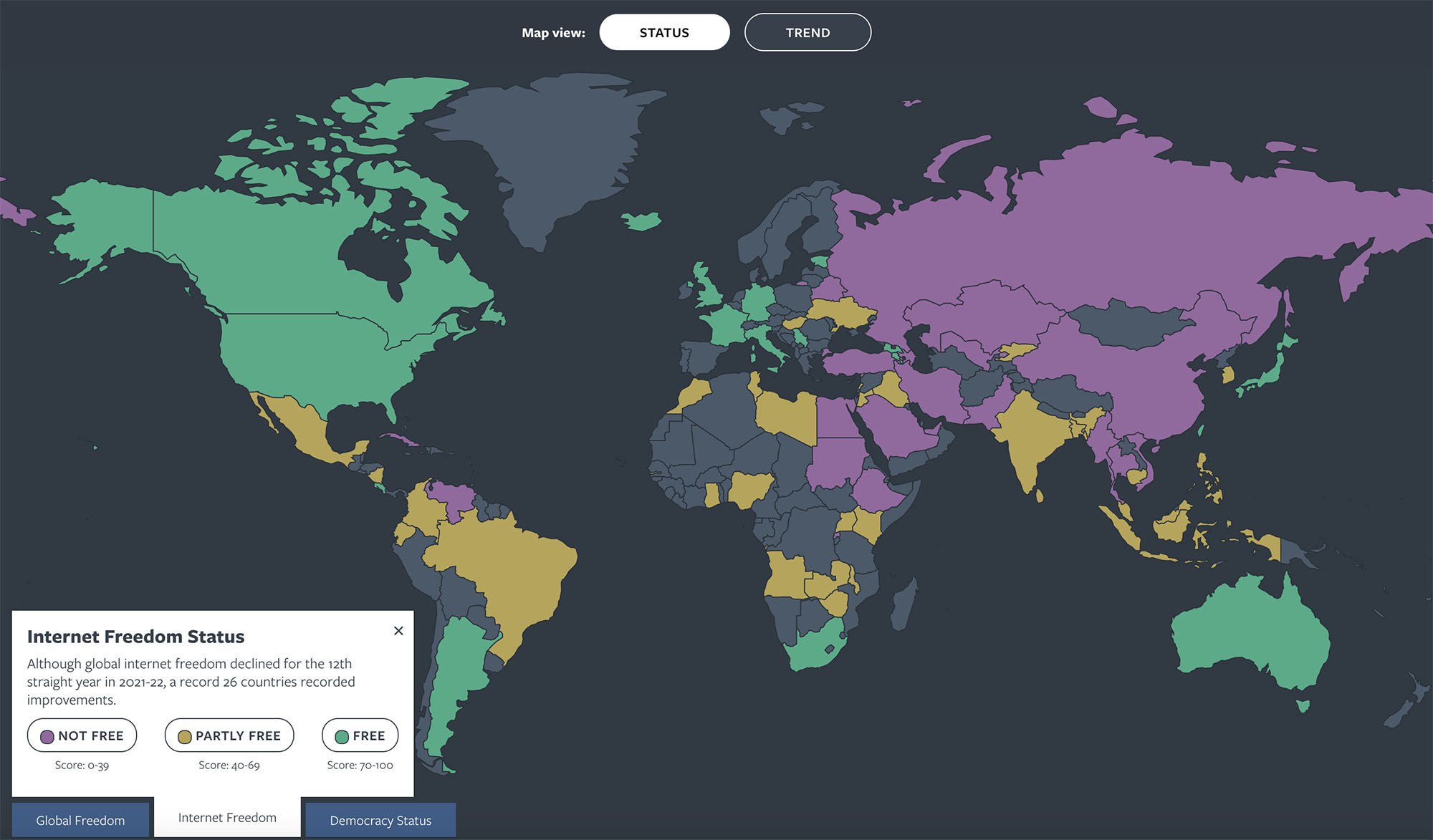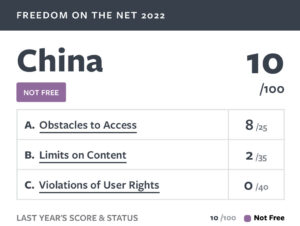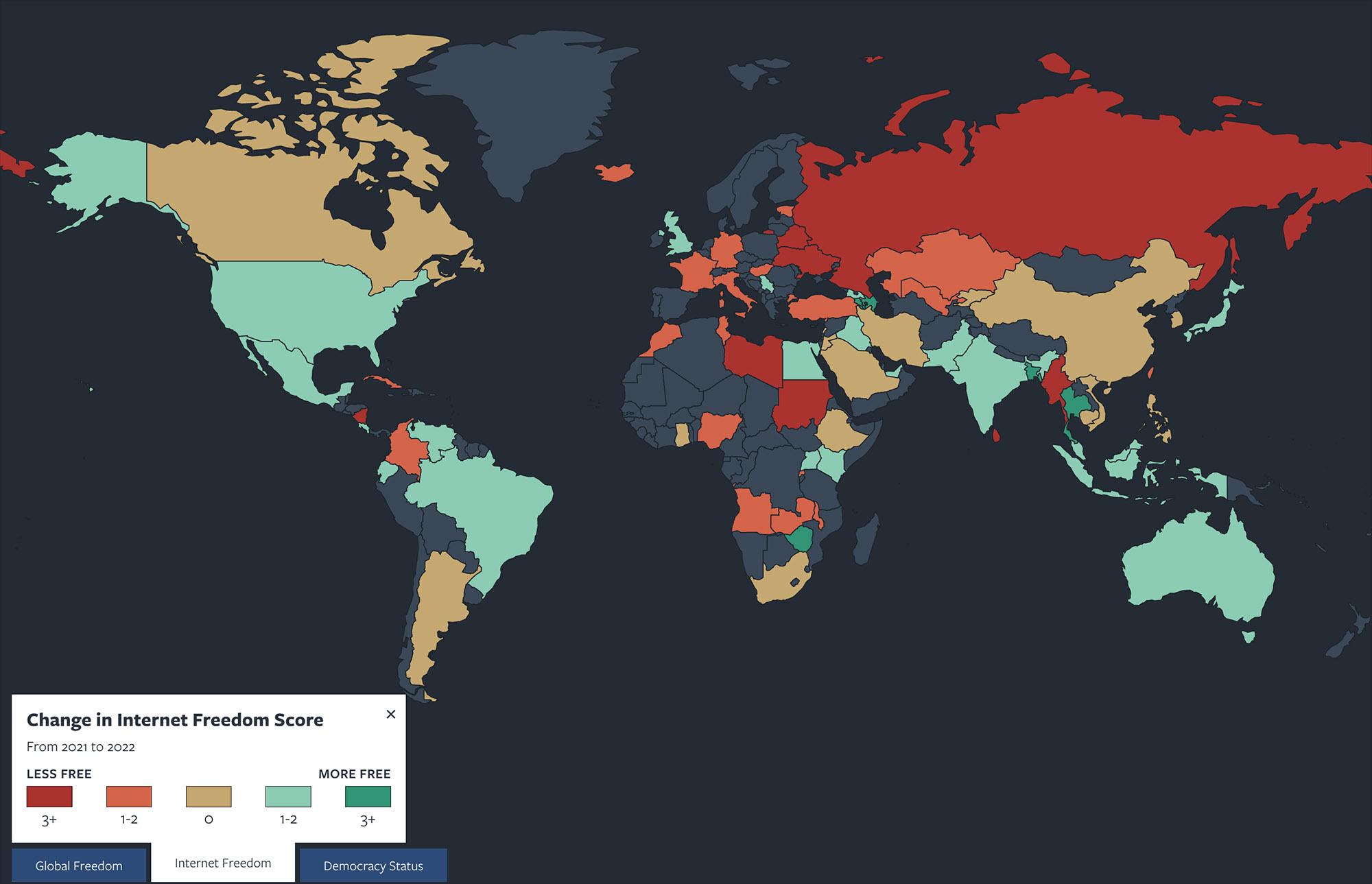
Above is the FreedomHouse map for 2022 showing its ratings on Internet Freedom around the globe.
Living in the US, I’m rather ignorant of what limitations other countries might have, because while there might be more surveillance here than some would like, practically speaking, you can say whatever you want unless it’s a direct incitement to violence or child pornography.
Of course, there may be consequences to what you say – libel laws, fire-in-a-crowded-theater, etc. all still apply, but if you want to criticize the government, you can do it. For example, you can say
- Joe Biden is a sputtering senile old bat who can’t spell his own name without an assistant
- Ron DeSantis is a jibbering water-brained idiot who can’t tie his own shoes
…and you can put it in bold colored font on the most popular web site on the entire Internet (more or less) and you will not be arrested.
When I think about Internet freedom, that’s what I think about. However, FreedomHouse thinks about other things as well. Read on.
Looking at the FreedomHouse map, none of the purple on this map really surprises me. I never expected that Russia, China, Belarus, Iran, etc. were going to be beacons of freedom. But a few colors did surprise me, which reminds me I don’t know the world as well as I’d like.
No One at FreedomHouse Has Ever Left Washington, D.C.
There are three subcategories to FreedomHouse’s scores:
- Obstacles to access (25% of score)
- Limits on Content (35% of score)
- Violations of User Rights (40% of score)
While I think their reporting has value, it’s important to keep FreedomHouse’s perspectives and biases in mind.
- For FreedomHouse, the Internet is primarily about political activism. Whether you can use the Internet to get a job, get educated, or get your jollies (in the case of pornography) is of little interest to them. So even though you might care more about watching FIFA games than organizing a protest march…well, FreedomHouse thinks you shouldn’t. Also, they’re only interested in the politics they’re interested in. For example, is it a limitation of freedom when online sales of guns between legally authorized buyers is prohibited, or if Internet providers choose not to allow payments for those transactions? Some will say no, and some will say yes. Is banning pornography a free speech issue? Some will say no and some will say yes. FreedomHouse simply doesn’t care. They will define your freedom for you, thank you very much.
- They take the view that the Internet is a human right, and thus any country that does not have robust universal Internet access is depriving humans of their rights. If we say that 90s/early 2000s was the time when the Internet was ready for mass adoption, to suddenly say “100% of your people don’t have it, and you’re now a bad country” is silly. I’m hardly surprised that 15-20 years on, large, poor nations have not been able to roll out robust broadband solutions. It’s as if you suddenly put a goal post a mile away and say “you’re not there yet so you we are marking you down”. To me, that’s a story about poverty, not freedom.
- Some countries are marked down because there is something untrue on the Internet. For example, there is a lot of squawking about “fake news” and “misinformation” on various country reports, but how does that affect Internet freedom? Some half-bright individual reading bad info about COVID imperils a nation’s liberty? This is not clear thinking. They call out “false information ahead of an election” (which has been going on since at least 1788 in this country and for a long time in many others) with scowling mark-downs.
- “Social media content moderation policies” are not really a risk to human freedom, but FreedomHouse views Facebook as the Internet so anything that restricts the free and furious flows of likes is a problem. What about all those free people who don’t use Twitter…are they even really free?
- FH often calls out individual cases inappropriately. For example, Joshua Garton was “detained for two weeks” in Tennessee for posting a meme of police urinating on a gravestone. He was held because he was a mentally disturbed homeless man who couldn’t post bail, and once he had a hearing the case was dismissed. Maybe he shouldn’t have been arrested, but is this really a systematic oppression of freedom nationwide? You can always find individual cases in any country where the system didn’t do something right, but saying “we expect human perfection” is prima facie absurd. I’m picking American examples because I understand this country best but this silly practice of shrieking about individual cases that are obviously outliers is resplendent.
- As with nearly all American think tanks, if you are not a liberal, free-trade democracy, you start with a heavy thumb on the scale, so the ability to truly be objective about other non-Western countries is somewhat compromised.
- There are substantial areas of the world that are simply marked “No Data”. I understand that FH probably doesn’t have a correspondent in North Korea or Syria, but the absence of Scandinavia, Israel, Poland, and much of Europe is disappointing. How calibrated can a region’s ratings be if significant participants are absent?
- They don’t understand the difference between the words “methodology” and “method” but this is common among intellectuals.
To summarize, FreedomHouse reports how FreedomHouse thinks the world should be and where it falls short. Now, many people will agree with most of what FH advocates, so you can use it as a general index for Internet freedom.
As far as scores, I would take FreedomHouse as a rough banding guide. With a higher number indicating more freedom, ranking China a 10 and Iceland a 95 makes sense. But to mark a country at 69 and color it yellow while painting another at 70 in green is absurd, because of FH’s own biases and the simple fact that their methods don’t yield such precision. I’m skeptical anyone in India in 2022 is saying “I feel about 2% more free than I did last year.”
Just to state my own biases: I would rate the US an A on access, an A on censorship, and a B on rights. I’m generally appalled at the EU’s “regulation is our superpower” approach to the Internet so when I say “rights” I mean less about GDPR stuff and more about “stop building massive data centers in Utah to house all the data you harvest without a warrant”.
USA, Canada, and Extremes
OK, enough poli sci grad student post-legalization lounge discussion. Let’s talk numbers.
I’ll start with my home team, the greatest nation in world, the United States of America (if you disagree, submit a guest article). We scored a 76, with access/censorship/rights subscores of 21/25, 30/35, and 25/40. Major points were lost for affordability, and lack of strong data protection rights acts. There’s a ton of finer nit-picking I’m not going to go into because honestly some of it is rather politically shaded.
As far as access, yeah, you can get a phone and a cheap convenience-store plan, but really, in a land where Amazon advertises $15/hour jobs on billboards, a $400 smart phone (+10% sales tax, thanks) with a $75/month cell bill takes a stiff chunk of someone’s monthly paycheck. A laptop and broadband at home is about the same, or perhaps in addition. Is that a freedom problem, is capitalism the problem, is capitalism the solution, or is it not a problem at all? You decide.
But on rights I agree as mentioned above. Some of these comments are silly, but in the category “Does state surveillance of internet activities infringe on users’ right to privacy”, well, what can you say…though if we weigh government competence vs. Silicon Valley PhDs into the mix, Big Tech is scarier.
“Are websites, governmental and private entities, service providers, or individual users subject to widespread hacking and other forms of cyberattack?” We lost 2 points here…but that’s because everything under the sun is hosted here.
Canada scores 23+32+32 = 87. FH does call out Canada for some of their “hate speech” censorship.
Iceland tops the list at 25 access + 34 censorship + 36 rights = 95.
 At the absolute bottom is China. For the eighth year in a row. I wouldn’t want to live in either, but if forced, I’d chose China over Myanmar, yet the latter affords marginally more Internet freedom to its citizenry than the world’s most populist state.
At the absolute bottom is China. For the eighth year in a row. I wouldn’t want to live in either, but if forced, I’d chose China over Myanmar, yet the latter affords marginally more Internet freedom to its citizenry than the world’s most populist state.
Congrats on that perfect goose egg on user rights, Pooh.
Occasionally someone will say something silly like “oh, you’ve never been to China, you don’t know what it’s like there, you would actually like living in some parts”. When they do, I think of things like this.
The Americas
So why is Mexico a yellow? It scores a 61 and the cutoff for “Free” is 70. A lot of countries lose some points for access, and in many countries, lack of robust competition in markets for service delivery is another chunk of points. Where Mexico really loses points is in corruption and cases of violence or threats against journalists.
Brazil scores a 65, for many of the same reasons as Mexico. Ecuador and Columbia are 64s. On a scale of 1-100, it’s really up to you if 5-6% in categories that have some subjective components changes a country from “free” to “partly free” in your mind.
Cuba (20) is a different story. Here are a couple key events that FreedomHouse noted in the year ending May 31, 2022:
- To quell dissent amid historic protests in July 2021, Cuban officials restricted internet connectivity, blocked various social media and communications platforms and virtual private network (VPN) systems, and selectively disrupted the mobile and fixed-lines connections of activists and dissidents.
- Approved in May 2022, Cuba’s new penal code further criminalizes online speech, establishing explicit and frequently heightened penalties for several alleged crimes carried out over digital networks, including slander and the use of social networks to organize protests.
That provides some calibration.
Europe
Nearly all of the EU is green. (Hungary scores a 69 which is one point below green). Marking Ukraine (59) down because it’s been invaded and is implementing wartime censorship measures seems silly to me but whatever.
UK, France, Germany, Italy – they spread is only 4 points between them. Hooray for Estonia at 93!
Unfortunately big chunks of the EU are missing.
If you keep going East, you may run into Belarus (score: 28), where
- The authorities continued to arrest and prosecute hundreds of journalists, media workers, bloggers, and ordinary internet users, imposing prison sentences ranging from 13 to 18 years on several bloggers and journalists who were initially arrested in 2020
- Security forces raided the homes of journalists and bloggers, continued to employ torture against those detained for criticizing the government online, and increased their use of forced “repentant videos” to humiliate and marginalize critical voices.
It’s almost like these ratings are on a log scale because going across the border from 59 (Ukraine) to 28 (Belarus) seems like a lot more than a 50% reduction in freedom.
Africa and the Middle East
In all of Africa, only South Africa (71) is green. At the bottom are Egypt and Ethiopia, both at 27. Let’s play a game where you guess which sentence from the report applies to which country:
- Authorities continued to harass journalists, bloggers, and activists. At least two social media users were forcibly disappeared during the coverage period
- A YouTube journalist was forcibly disappeared during the coverage period, and journalists widely reported being targeted in online harassment campaigns
Answer: It doesn’t really matter, does it?
The Middle East is a sea of purple, which is not surprising. Many of the yellows such Libya (44) , Iraq (42), and Jordan (47) are not into the yellow by much.
India and Asia
India is at 51, which is an improvement over 49 last year. The score is 13/25 access, 21/35 censorship, and 17/40 rights.
FH marks India down due to the rural poverty factors we’ve already discussed and also because India has a habit of shutting off the Internet in local areas whenever there is a protest. For example, in 2021, access in the Delhi area was switched off repeatedly because of farm protests. I find that sort of government kill switch – which affects up to 50m people every time you throw it! – grimly fascinating as it implies all traffic goes through government-controlled choke points.
Bangladesh is a miserable 43, and really once you get into the 40s or below, many of these countries all have the same problems: they’re poor, they’re corrupt, and elites keep a tight grip on the Internet.
One country that jumped out at me just to the North of India is Kyrgyzstan, which scores a 53 (higher than India). Its scores are very similar but it affords somewhat better access.
Heading Eastward, there is much yellow. Indonesia is 49, Malaysia is 59, and the Philippines is 65, or nearly green. The completely free and independent nation known as Taiwan hosts one of the “freest online environments in Asia”, scoring 79. As it is adjacent to the worst country on the list, China (10), I believe the 180km of the Taiwan Straits represents that greatest border freedom delta (69) on the planet.
Japan (77) is virtually identical to the US. Hmmm, I wonder who wrote their constitution…
However, South Korea only earned a 67. Before I looked at the numbers, I guessed they scored very well on access (and they did: 22/25). Alas, this means they lost points on censorship and user rights.
Trends
Here’s what the 2021 to 2022 trend looks like:. Green is going in the right direction, red the reverse:

You need to keep the underlying numbers in your head when looking at the colors. For example, the US is improving (green), but Canada’s yellowish color just means they’re staying in place – but they were 11 points ahead of the US. More grimly, China is also treading water – at the very bottom, keeping its abysmal rating of 10 year-over-year (actually year-over-year-over-year-over-year-over-year-over-year-over-year-over-year).
Russia has cratered from last year’s 30 to this year’s 23. It has never been below 30 until 2022. The runner-up for “moving the fastest in the wrong direction” is Myanmar (-5).
Countries improving the most are Armenia, Azerbaijan, Bangladesh, Thailand, and Zimbabwe, all by 3 points.
Conclusion
The Freedom House report is flawed in places and downright silly in others, and it’s written more from an activist than an analytic perspective. However, it provides an interesting survey of the global virtual landscape.
While some areas could use a little improvement (USA), and others are improving and hopefully will continue on their course (India), some regions such as China and Russia seem locked into an alternate universe. Indeed, the “Internet” is increasingly a patchwork of splintered jurisdictional networks.
I’m glad I live in a green country. Do you?























Here’s a great post that I came across and I’ve been searching for this kind of post for the past week or so. Thank you so much and will be looking for more posts from you.